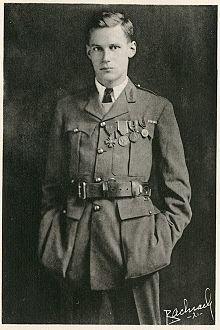Harry Crosby | |
|---|---|
 Crosby in 1919 | |
| Born | Henry Sturgis Crosby June 4, 1898 Boston, Massachusetts, U.S. |
| Died | December 10, 1929 (aged 31) New York City, U.S. |
| Cause of death | Suicide |
| Occupation |
|
| Education | |
| Alma mater | Harvard University |
| Period | 1925–1929 |
| Notable works |
|
| Spouse | |
| Relatives |
|
Harry Crosby (June 4, 1898 – December 10, 1929) was an American heir, World War I veteran, bon vivant, poet, and publisher who for some epitomized the Lost Generation in American literature. He was the son of one of the richest banking families in New England, a Boston Brahmin, and the nephew of Jane Norton Grew, the wife of financier J. P. Morgan, Jr. As such, he was heir to a portion of a substantial family fortune. He was a volunteer in the American Field Service during World War I, and later served in the U.S. Ambulance Corps. He narrowly escaped with his life.
Profoundly affected by his experience in World War I, Crosby vowed to live life on his own terms and abandoned all pretense of living the expected life of a privileged Bostonian. In 1920 he met Mrs. Richard Peabody (née Mary Phelps Jacob), six years his senior. Their affair was the source of scandal and gossip among blue-blood Boston.
Mary (or Polly as she was called) divorced her alcoholic husband and to her family's dismay married Crosby. Two days later they left for Europe, where they devoted themselves to art and poetry. Both enjoyed a decadent lifestyle, drinking, smoking opium regularly, traveling frequently, and having an open marriage. Crosby wrote and published poetry that dwelled on the symbolism of the sun and explored themes of death and suicide.
He numbered among his friends some of the most famous individuals of the early 20th century, including Salvador Dalí, Ernest Hemingway, and Henri Cartier-Bresson. Polly took the name Caresse, and Crosby and she founded the Black Sun Press. It was the first to publish works by several struggling authors who later became famous, including James Joyce, Kay Boyle, Ernest Hemingway, Hart Crane, D. H. Lawrence, and René Crevel. Crosby died in 1929 as part of a murder–suicide or suicide pact.